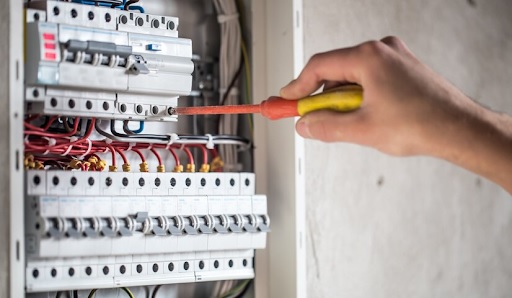Home remodeling projects are exciting endeavors that allow homeowners to transform their living spaces into more functional and aesthetically pleasing environments. Among the crucial contributors to the success of these projects is the residential electrician.
This article delves into the indispensable role played by residential electricians in home remodeling, examining their responsibilities, the importance of electrical considerations, and the expertise they bring to the table.
Understanding the Scope of Home Remodeling Projects
Aesthetic Upgrades and Functional Enhancements
Home remodeling projects can encompass a wide range of objectives, from cosmetic upgrades to structural modifications. Whether it’s creating an open-concept living space, updating kitchen appliances, or adding new lighting fixtures, the goals of these projects often extend beyond aesthetics to enhance the functionality and efficiency of the home.
Increased Energy Efficiency
In contemporary home remodeling, there is a growing emphasis on sustainability and energy efficiency. Homeowners frequently seek to integrate energy-efficient appliances, smart home technologies, and lighting solutions into their remodels. These enhancements not only contribute to environmental conservation but also lead to long-term cost savings.
The Crucial Role of a Residential Electrician
Electrical Safety and Code Compliance
One of the primary responsibilities of a residential electrician in home remodeling projects is to ensure electrical safety and compliance with local building codes.
Residential electricians assess the existing electrical system, identify potential hazards, and make recommendations to meet safety standards. Adhering to codes is crucial not only for the well-being of the occupants but also to avoid legal and regulatory issues.
Design and Layout Planning
Residential electricians play a pivotal role in the design and layout planning of electrical systems in remodeled spaces. They collaborate with homeowners and other professionals to determine the placement of outlets, switches, lighting fixtures, and other electrical components.
This meticulous planning ensures that the electrical infrastructure aligns seamlessly with the overall design and functionality goals of the project.
Key Responsibilities of Residential Electricians in Home Remodeling
Upgrading Electrical Panels
As home remodeling projects often involve the addition of new appliances, lighting fixtures, and electronic devices, residential electricians may recommend and carry out upgrades to the electrical panel.
This ensures that the home’s electrical system can handle the increased load safely and efficiently. Upgrading panels may also involve incorporating features such as circuit breakers for improved safety.
Wiring and Rewiring
In older homes or those undergoing extensive remodeling, residential electricians may engage in wiring or rewiring projects. This includes installing new wiring systems or updating existing ones to accommodate modern electrical needs.
Rewiring is particularly crucial when upgrading the electrical infrastructure to support new technologies or when addressing safety concerns related to outdated wiring.
Fixture Installation and Lighting Design
Residential electricians are instrumental in installing new lighting fixtures and designing the lighting layout for remodeled spaces. Their expertise extends beyond the technical aspects of installation to considerations of ambiance, functionality, and energy efficiency.
Whether it’s recessed lighting in a renovated kitchen or accent lighting in a remodeled living room, electricians contribute to creating well-lit and inviting spaces.
Smart Home Integration
The increasing prevalence of smart home technologies has become a significant aspect of modern home remodeling. Residential electricians are tasked with integrating smart home systems seamlessly into the electrical infrastructure.
This may involve installing smart thermostats, lighting controls, security systems, and other connected devices that enhance the overall functionality and convenience of the home.
Ensuring Electrical Load Balance
Balancing the electrical load is critical to preventing overloads and ensuring the safe operation of the electrical system. Residential electricians carefully assess the power requirements of new appliances and fixtures, distributing the load evenly across circuits.
This proactive approach helps prevent issues such as tripped breakers and potential damage to electrical components.
Troubleshooting and Problem Resolution
Home remodeling projects can uncover unforeseen electrical issues or complications. In such cases, residential electricians are adept at troubleshooting problems and providing effective solutions.
Whether it’s addressing wiring issues, resolving electrical malfunctions, or ensuring compatibility with the latest technologies, their problem-solving skills are invaluable in keeping the project on track.
Collaboration with Other Professionals
Working with Contractors and Designers
Residential electricians collaborate closely with other professionals involved in home remodeling projects, including general contractors and interior designers. This collaborative approach ensures that electrical considerations align with the overall vision of the project.
Effective communication among team members is key to achieving a cohesive and successful remodeling outcome.
Coordination with Plumbing and HVAC Specialists
In many remodeling projects, changes to the electrical system may coincide with alterations to plumbing and HVAC (heating, ventilation, and air conditioning) systems.
Residential electricians coordinate with specialists in these fields to ensure that all modifications are integrated seamlessly. This collaborative effort enhances the efficiency and effectiveness of the overall project.
The Intersection of Safety and Innovation

Fire Prevention and Safety Measures
Residential electricians prioritize fire prevention by implementing safety measures in their remodeling projects. This includes the installation of smoke detectors, ground fault circuit interrupters (GFCIs), and surge protection devices. These measures not only comply with safety codes but also significantly reduce the risk of electrical fires in the home.
Incorporating Energy-Efficient Solutions
In line with the growing emphasis on sustainability, residential electricians incorporate energy-efficient solutions into their remodeling projects.
This may involve recommending LED lighting, energy-efficient appliances, and smart home systems that contribute to lower energy consumption. By embracing innovation, electricians help homeowners reduce their environmental footprint while enjoying long-term cost savings.
Choosing the Right Residential Electrician
Credentials and Licensing
When embarking on a home remodeling project, selecting the right residential electrician is paramount. Homeowners should prioritize electricians with the appropriate credentials and licensing. This ensures that the electrician has undergone the necessary training and adheres to industry standards and regulations.
Experience and Reputation
The experience of a residential electrician is a key factor in their ability to navigate the complexities of a remodeling project.
Homeowners should seek professionals with a track record of successfully completing similar projects and a positive reputation within the community. References and reviews from past clients can offer insights into the electrician’s reliability and workmanship.
Communication and Collaboration Skills
Effective communication is essential in any remodeling project, and residential electricians are no exception. Homeowners should choose electricians who demonstrate strong communication and collaboration skills. The ability to work seamlessly with other professionals involved in the project ensures a cohesive and well-coordinated remodeling experience.
Innovative Thinking and Adaptability
Given the dynamic nature of the electrical industry and the evolving technologies in home automation, homeowners may benefit from electricians who exhibit innovative thinking and adaptability. Electricians who stay abreast of industry trends and emerging technologies can provide valuable insights into integrating cutting-edge solutions into the home.
Conclusion
In the grand tapestry of home remodeling, residential electricians emerge as essential contributors, weaving together safety, innovation, and functionality. Their expertise encompasses not only the technical aspects of electrical systems but also the collaborative skills needed to harmonize their work with the broader vision of the project.
Whether upgrading panels, designing lighting layouts, or troubleshooting unforeseen issues, residential electricians play a pivotal role in empowering homeowners to transform their living spaces with confidence and efficiency.
As the intersection of safety and innovation, the role of a residential electrician is a linchpin in the success of home remodeling projects, ensuring that homes not only


